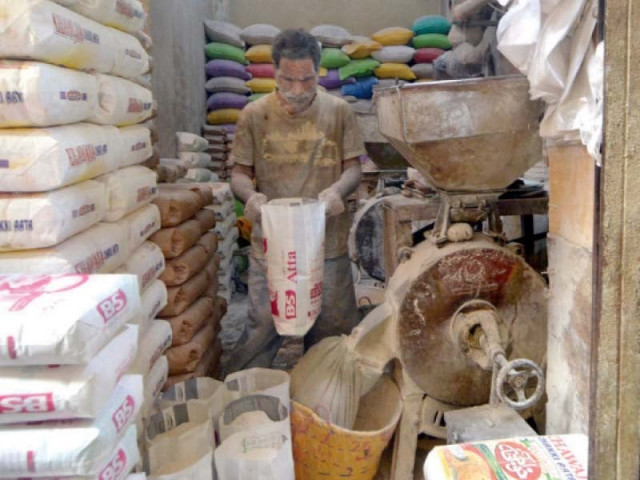Flour crisis deepens in Punjab
Price reaches all-time high of Rs145 per kg in Lahore

With the price of wheat hitting Rs5,000 per maund in the grain markets, the rate of flour has hit Rs150 per kilogramme in Rawalpindi’s open market.
A 15-kg bag of flour is being sold for Rs2,250 in the garrison city.
An ex-mill red flour bag is available for Rs11,650 in the city while the rate of an ex-mill fine flour bag has increased to Rs13,000.
The Pakistan Flour Mills Association (PFMA) said the official quota of wheat was low and wheat was being sold at Rs5,400 per maund in the open market.
The city’s Naanbai Association has warned that they would be compelled to increase the rate of a roti by Rs5 again if the prices were not brought under control.
Similarly, the whole-grain chakki flour has jumped up to an all-time high of Rs145 per kg across Lahore.
Apart from that, different brands of flour are being sold at a price of Rs130 per kg in the provincial capital.
Flour millers in Lahore blame the reduced wheat releases from the government for the increase in prices.
Chakki owners hold the shortage of grains and high wheat support price responsible for the uptick in the flour rates in Punjab.
Former PFMA chairman Khaleeq Arshad told The Express Tribune that hardly 21,000-22,000 tonnes of wheat was being released by the Punjab food department. The release of government wheat in Sindh, Khyber-Pakhtunkhwa and Balochistan was also negligible, he added. “There are insufficient grains in the market in comparison with the demand,” he maintained.
In addition, he indicated that the government had delayed wheat import despite having complete knowledge of the current market situation.
“Smuggling and black marketing of wheat flour are other factors responsible for the price increase,” he pointed out.
Besides these local problems and internal mismanagement, Arshad pointed out that the Russia-Ukraine war had also made wheat import difficult.
During previous years, Pakistan imported huge quantities of wheat from Ukraine but currently this supply line was disturbed because of the conflict.
The ex-PFMA chairman also noted that the government was not allowing the private sector, which was far more efficient than its agencies, to import wheat.
Responding to a question, he said wheat flour had touched Rs2,000 per 15-kg sack in different markets across the province because of the shortage of the grains.
All provincial governments are releasing limited wheat stocks while anticipating high demand during the holy month of Ramazan which would fall in March ahead of the harvesting of the new crop.
An atta chakki owner, Muhammad Liaqat Ali, said they were buying wheat at a price ranging between Rs4,900 and Rs5,000 per maund, while their peak-hour electricity tariffs had reached Rs70-Rs80 per unit.
“Such high input costs have compelled us to raise whole-wheat chakki flour rates,” he added.
He complained that the local administration was taking actions against chakki owners instead of paying attention to the core issue of grain supply.
He claimed that even though the whole-wheat chakki flour rate had touched Rs145 per kg, the profit margin of chakki owners had reduced despite multiple increases in rates.
Since the fall of the PTI government in April last year, the price of wheat has doubled in the country.
Back then, wheat was traded at Rs2,200 per maund in markets across the province.
However, that rate has now reached Rs5,000 because of political reasons and administrative failure of the provincial governments.
Independent experts and industry leaders claimed that the early announcement of the Rs4,000 wheat support price by the Sindh government had helped in driving the market sentiments.
Other provinces had also followed the suit mainly for political reasons and the upcoming general elections.
Although it is not yet clear who will benefit from this political decision, but the economic issue it has caused has crushed the urban middle-class under unprecedented inflation.
With additional input from our correspondent in Rawalpindi



















COMMENTS
Comments are moderated and generally will be posted if they are on-topic and not abusive.
For more information, please see our Comments FAQ